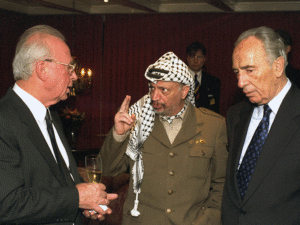When Israeli filmmaker Mor Loushy was a teenager, she went to a peace rally in Tel Aviv to support the signing of the Oslo Accords. She remembers thinking that Israel was on the verge of reaching a lasting peace with the Palestinians and says that the gathering was euphoric, with tens of thousands of Israelis dancing, singing and cheering.
She also remembers a sudden moment of silence – the music stopped and the crowds soon vanished. Only when she arrived home and turned on the news did she realize that, at the end of the rally, Israeli Prime Minister Yitzhak Rabin had been assassinated.
“We were awake all night long watching television … everyone was crying,” Loushy says, adding that what they were mourning was not just the loss of Israel’s leader, but the prospects for peace in the Mideast. “We believed that peace is happening. (Israelis) were thinking, ‘We’re there.’ ”
These vivid memories have likely been even more prominent in recent years, as Loushy and co-director Daniel Sivan worked on The Oslo Diaries, a documentary that goes behind the scenes of the secret negotiations between Israeli and Palestinian leaders in the early 1990s.
The film will enjoy its national premiere at the Hot Docs Canadian International Documentary Festival in Toronto. It screens on May 1 at the TIFF Bell Lightbox theatre and May 2 at the Isabel Bader Theatre.
The discussions that brought about the peace process occurred during an era when the atmosphere in Israel and the Palestinian territories was quite polarized. Rabin had affirmed to the Israeli people that he would not negotiate with the Palestine Liberation Organization (PLO), the terrorist group led by Yasser Arafat. Violent clashes and suicide bombings were frequent.

Due to those divisions, The Oslo Diaries focuses less on the political intricacies of these laborious peace talks and more on the close bonds that developed between members of the Israeli government and the PLO. Key characters include chief Palestinian negotiator Abu Ala, Israeli diplomat Uri Savir and Israeli professors and historians Ron Pundak and Yair Hirschfeld.
Loushy was at Hot Docs in 2015 with Censored Voices, her controversial film about the Six-Day War that Sivan produced. She explains that while their previous collaboration is one of many films to explore themes of war and trauma in Israel, there are very few about peace in the Middle East.
READ: FILM ON OSKAR GROENING TO PREMIERE AT HOT DOCS
As violence continues to flare along the Israel-Gaza border, Loushy adds that the time is right for this documentary.
“I think that a lot of people feel that this is such a dark time (in the Middle East), a time where there’s no hope, no optimism,” Loushy tells The CJN. “ ‘Peace’ is a word that makes you sound naive.”
As there is barely any official footage from the secret negotiations, the filmmakers relied on the titular writings from the main players. Pundak’s diary was partially published when Loushy and Sivan began working on the film. His widow gave them access to more of his reflective writings about the peace talks. (Pundak died of cancer in 2014.)
Meanwhile, many of the scenes involving the discussions had to be filmed with re-enactments featuring actors who look uncannily like the negotiators. The directors also included gems of rarely seen archival footage, which were filmed by those with close access to some of the central figures.
Loushy considers The Oslo Diaries to be an optimistic film, buoyed by the presence of many of the diplomats who readily accepted the opportunity to be interviewed on-camera.
“The fact that the Palestinian leadership was interviewed for this film … about peace is a big thing,” Loushy says, adding that there are plans to air the documentary as a three-part series on Israeli television.
Another major figure the filmmakers interviewed was Shimon Peres, the former Israeli prime minister who won the Nobel Peace Prize for his work on the Oslo Accords. His stirring conversation with the directors happened mere weeks before he died in September 2016.
Loushy explains that the political climate in Israel has only become more combative since Rabin’s assassination. Nevertheless, she also hopes the documentary can carve out a space to get Israelis talking about peace.
“What we’re missing today is the willingness to go toward peace,” she says. “At the end of the day, there must be a solution of peace.”






